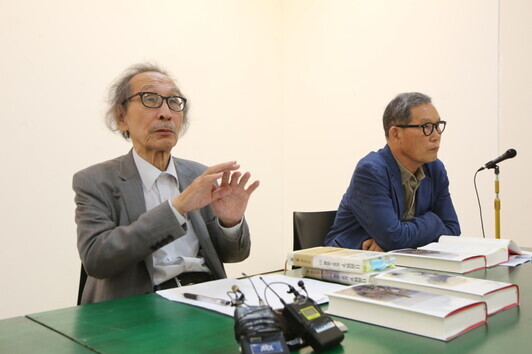hankyoreh
Links to other country sites 다른 나라 사이트 링크
S. Korean comfort women ruling reflects trends in international law, Japanese academics say

Progressive Japanese scholars have publicly said that a South Korean court ruling ordering Japan to compensate the so-called “comfort women” reflects trends in international law. They said that the South Korean and Japanese government should upgrade their comfort women agreement, reached in December 2015, to resolve the issue.
Eight scholars held a press conference at the National Diet Building in Tokyo’s Chiyoda Ward on the afternoon of Wednesday. They presented a joint statement containing their thoughts about how to resolve the comfort women issue. The scholars included Haruki Wada, professor emeritus at the University of Tokyo; Masatoshi Uchida, an attorney; and Aiko Utsumi, professor emeritus at Keisen University.
According to these scholars, the South Korean court order in January for the Japanese government to compensate the former comfort women “reflected a recent trend in international law for human rights to take precedence over ‘sovereign immunity.’”
Sovereign immunity is a principle in customary international law stating that one country’s courts cannot try the sovereign actions of another country.
“Since the 2000s, there has been a movement around the world for [aggressor] states to apologize and compensate for pain and violence that occurred during colonial rule,” the scholars explained.
But these scholars, who are longtime observers of South Korea-Japan relations, remarked that “historical issues can’t be resolved through a judicial ruling.”
“Since this issue is connected to historical attitudes, foreign policy, and public sentiment, it can only be resolved through persistent dialogue, diplomatic wisdom, and public persuasion,” they said.
A considerable portion of the seven-page statement is devoted to recounting the history of reconciliation and compromise between the two countries over the past 25 years, beginning with the testimony in 1991 by former comfort woman Kim Hak-sun (who died in 1997), the Kono Statement in 1993, and the comfort women agreement in 2015.
Historical issues must be resolved “through a joint effort that is grounded in the consent and reconciliation of the people of South Korea and Japan,” the scholars said, arguing that the only solution available to Japan is “dialogue with South Korea.”
The scholars called on the governments of South Korea and Japan to “reaffirm the comfort women agreement reached on December 2015” despite the various controversies surrounding it. “We hope they will make an effort to further elevate the spirit of the agreement.”
The agreement stated that “the Government of Japan is painfully aware of responsibilities” and that “Prime Minister Abe expresses anew his most sincere apologies and remorse to all the […] comfort women.” The scholars proposed that current Japanese Prime Minister Yoshihide Suga sign a documentary version of that part of the agreement and have the Japanese embassy in South Korea convey it to the surviving comfort women.
The scholars also had a request for the South Korean government. Noting that President Moon Jae-in has officially recognized the comfort women agreement, they called on him to negotiate with Japan for the money paid by the Japanese government at the time of the agreement to be used to set up a comfort women research institute.
“That would provide evidence that [Japan] is ensuring that the pain of the victims will not be forgotten, but will be remembered by future generations,” the scholars said.
“COVID-19 and climate change are just some of the numerous challenges that South Korea and Japan, or East Asia as a whole, must work together to resolve. We need to improve South Korea-Japan relations.”
By Kim So-youn, staff reporter
Please direct comments or questions to [english@hani.co.kr]

Editorial・opinion
![[Column] Season 2 of special prosecutor probe may be coming to Korea soon [Column] Season 2 of special prosecutor probe may be coming to Korea soon](https://flexible.img.hani.co.kr/flexible/normal/500/300/imgdb/original/2024/0426/3317141030699447.jpg) [Column] Season 2 of special prosecutor probe may be coming to Korea soon
[Column] Season 2 of special prosecutor probe may be coming to Korea soon![[Column] Park Geun-hye déjà vu in Yoon Suk-yeol [Column] Park Geun-hye déjà vu in Yoon Suk-yeol](https://flexible.img.hani.co.kr/flexible/normal/500/300/imgdb/original/2024/0424/651713945113788.jpg) [Column] Park Geun-hye déjà vu in Yoon Suk-yeol
[Column] Park Geun-hye déjà vu in Yoon Suk-yeol- [Editorial] New weight of N. Korea’s nuclear threats makes dialogue all the more urgent
- [Guest essay] The real reason Korea’s new right wants to dub Rhee a founding father
- [Column] ‘Choson’: Is it time we start referring to N. Korea in its own terms?
- [Editorial] Japan’s rewriting of history with Korea has gone too far
- [Column] The president’s questionable capacity for dialogue
- [Column] Are chaebol firms just pizza pies for families to divvy up as they please?
- [Column] Has Korea, too, crossed the Rubicon on China?
- [Correspondent’s column] In Japan’s alliance with US, echoes of its past alliances with UK
Most viewed articles
- 1AI is catching up with humans at a ‘shocking’ rate
- 2After election rout, Yoon’s left with 3 choices for dealing with the opposition
- 3Is Japan about to snatch control of Line messenger from Korea’s Naver?
- 4South Korea officially an aged society just 17 years after becoming aging society
- 51 in 5 unwed Korean women want child-free life, study shows
- 6[Column] ‘Choson’: Is it time we start referring to N. Korea in its own terms?
- 7Korea’s 1.3% growth in Q1 signals ‘textbook’ return to growth, says government
- 8No good, very bad game for Korea puts it out of Olympics for first time since 1988
- 9[Editorial] Japan’s rewriting of history with Korea has gone too far
- 10Why Korea shouldn’t welcome Japan’s newly beefed up defense cooperation with US